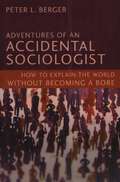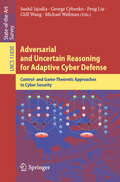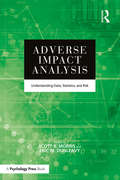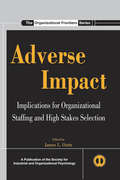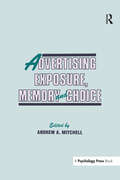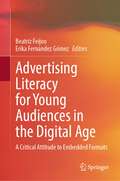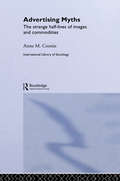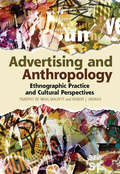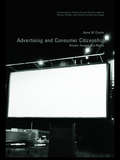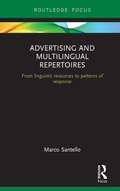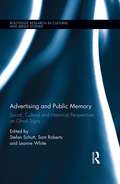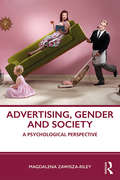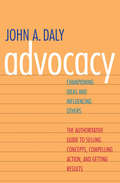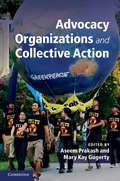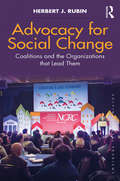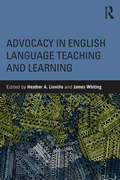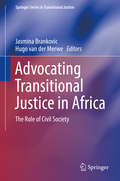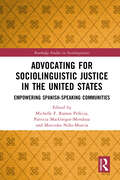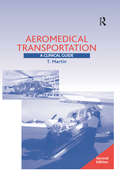- Table View
- List View
Adventures of an Accidental Sociologist: How to Explain the World Without Becoming a Bore
by Peter L. BergerPeter L. Berger is arguably the best-known American sociologist living today. Since the 1960s he has been publishing books on many facets of the American social scene, and several are now considered classics. So it may be hard to believe Professor Berger's description of himself as an "accidental sociologist." But that in fact accurately describes how he stumbled into sociology. In this witty, intellectually stimulating memoir, Berger explains not only how he became a social scientist, but the many adventures that this calling has led to. Rather than writing an autobiography, he focuses on the main intellectual issues that motivated his work and the various people and situations he encountered in the course of his career. Full of memorable vignettes and colorful characters depicted in a lively narrative often laced with humor, Berger's memoir conveys the excitement that a study of social life can bring. The first part of the book describes Berger's initiation into sociology through the New School for Social Research, "a European enclave in the midst of Greenwich Village bohemia." Berger was first a student at the New School and later a young professor amidst a clique of like-minded individuals. There he published The Social Construction of Reality (with colleague Thomas Luckmann), one of his most successful books, followed by The Sacred Canopy on the sociology of religion, also still widely cited. The book covers Berger's experience as a "globe-trekking sociologist" including trips to Mexico, where he studied approaches to Third World poverty; to East Asia, where he discovered the potential of capitalism to improve social conditions; and to South Africa, where he chaired an international study group on the future of post-Apartheid society. Berger then tells about his role as the director of a research center at Boston University. For over two decades he and his colleagues have been tackling such important issues as globalization, the secularization of Europe, and the ongoing dialectic between relativism and fundamentalism in contemporary culture. What comes across throughout is Berger's boundless curiosity with the many ways in which people interact in society. This book offers longtime Berger readers as well as newcomers to sociology proof that the sociologist's attempt to explain the world is anything but boring.
Adversarial and Uncertain Reasoning for Adaptive Cyber Defense: Control- and Game-Theoretic Approaches to Cyber Security (Lecture Notes in Computer Science #11830)
by Sushil Jajodia Cliff Wang Peng Liu George Cybenko Michael WellmanToday’s cyber defenses are largely static allowing adversaries to pre-plan their attacks. In response to this situation, researchers have started to investigate various methods that make networked information systems less homogeneous and less predictable by engineering systems that have homogeneous functionalities but randomized manifestations. The 10 papers included in this State-of-the Art Survey present recent advances made by a large team of researchers working on the same US Department of Defense Multidisciplinary University Research Initiative (MURI) project during 2013-2019. This project has developed a new class of technologies called Adaptive Cyber Defense (ACD) by building on two active but heretofore separate research areas: Adaptation Techniques (AT) and Adversarial Reasoning (AR). AT methods introduce diversity and uncertainty into networks, applications, and hosts. AR combines machine learning, behavioral science, operations research, control theory, and game theory to address the goal of computing effective strategies in dynamic, adversarial environments.
Adverse Events: Race, Inequality, and the Testing of New Pharmaceuticals (Anthropologies of American Medicine: Culture, Power, and Practice #9)
by Jill A. FisherWinner, 2022 Donald W. Light Award for Applied Medical Sociology, given by the Medical Sociology Section of the American Sociological AssociationWinner, 2021 Robert K. Merton Book Award, given by the Science, Knowledge, and Technology Section of the American Sociological Association2021 Outstanding Academic Title, Choice MagazineExplores the social inequality of clinical drug testing and its effects on scientific resultsImagine that you volunteer for the clinical trial of an experimental drug. The only direct benefit of participating is that you will receive up to $5,175. You must spend twenty nights literally locked in a research facility. You will be told what to eat, when to eat, and when to sleep. You will share a bedroom with several strangers. Who are you, and why would you choose to take part in this kind of study? This book explores the hidden world of pharmaceutical testing on healthy volunteers. Drawing on two years of fieldwork in clinics across the country and 268 interviews with participants and staff, it illustrates how decisions to take part in such studies are often influenced by poverty and lack of employment opportunities. It shows that healthy participants are typically recruited from African American and Latino/a communities, and that they are often serial participants, who obtain a significant portion of their income from these trials. This book reveals not only how social inequality fundamentally shapes these drug trials, but it also depicts the important validity concerns inherent in this mode of testing new pharmaceuticals. These highly controlled studies bear little resemblance to real-world conditions, and everyone involved is incentivized to game the system, ultimately making new drugs appear safer than they really are. Adverse Events provides an unprecedented view of the intersection of racial inequalities with pharmaceutical testing, signaling the dangers of this research enterprise to both social justice and public health.
Adverse Events: Race, Inequality, and the Testing of New Pharmaceuticals (Anthropologies of American Medicine: Culture, Power, and Practice)
by Jill A. FisherExplores the social inequality of clinical drug testing and its effects on scientific resultsImagine that you volunteer for the clinical trial of an experimental drug. The only direct benefit of participating is that you will receive up to $5,175. You must spend twenty nights literally locked in a research facility. You will be told what to eat, when to eat, and when to sleep. You will share a bedroom with several strangers. Who are you, and why would you choose to take part in this kind of study? This book explores the hidden world of pharmaceutical testing on healthy volunteers. Drawing on two years of fieldwork in clinics across the country and 268 interviews with participants and staff, it illustrates how decisions to take part in such studies are often influenced by poverty and lack of employment opportunities. It shows that healthy participants are typically recruited from African American and Latino/a communities, and that they are often serial participants, who obtain a significant portion of their income from these trials. This book reveals not only how social inequality fundamentally shapes these drug trials, but it also depicts the important validity concerns inherent in this mode of testing new pharmaceuticals. These highly controlled studies bear little resemblance to real-world conditions, and everyone involved is incentivized to game the system, ultimately making new drugs appear safer than they really are. Adverse Events provides an unprecedented view of the intersection of racial inequalities with pharmaceutical testing, signaling the dangers of this research enterprise to both social justice and public health.
Adverse Impact Analysis: Understanding Data, Statistics, and Risk
by Scott B. Morris Eric M. DunleavyCompliance with federal equal employment opportunity regulations, including civil rights laws and affirmative action requirements, requires collection and analysis of data on disparities in employment outcomes, often referred to as adverse impact. While most human resources (HR) practitioners are familiar with basic adverse impact analysis, the courts and regulatory agencies are increasingly relying on more sophisticated methods to assess disparities. Employment data are often complicated, and can include a broad array of employment actions (e.g., selection, pay, promotion, termination), as well as data that span multiple protected groups, settings, and points in time. In the era of "big data," the HR analyst often has access to larger and more complex data sets relevant to employment disparities. Consequently, an informed HR practitioner needs a richer understanding of the issues and methods for conducting disparity analyses. This book brings together the diverse literature on disparity analysis, spanning work from statistics, industrial/organizational psychology, human resource management, labor economics, and law, to provide a comprehensive and integrated summary of current best practices in the field. Throughout, the description of methods is grounded in the legal context and current trends in employment litigation and the practices of federal regulatory agencies. The book provides guidance on all phases of disparity analysis, including: How to structure diverse and complex employment data for disparity analysis How to conduct both basic and advanced statistical analyses on employment outcomes related to employee selection, promotion, compensation, termination, and other employment outcomes How to interpret results in terms of both practical and statistical significance Common practical challenges and pitfalls in disparity analysis and strategies to deal with these issues
Adverse Impact Analysis: Understanding Data, Statistics, and Risk
by Scott B. Morris Eric M. DunleavyCompliance with federal equal employment opportunity regulations, including civil rights laws and affirmative action requirements, requires collection and analysis of data on disparities in employment outcomes, often referred to as adverse impact. While most human resources (HR) practitioners are familiar with basic adverse impact analysis, the courts and regulatory agencies are increasingly relying on more sophisticated methods to assess disparities. Employment data are often complicated, and can include a broad array of employment actions (e.g., selection, pay, promotion, termination), as well as data that span multiple protected groups, settings, and points in time. In the era of "big data," the HR analyst often has access to larger and more complex data sets relevant to employment disparities. Consequently, an informed HR practitioner needs a richer understanding of the issues and methods for conducting disparity analyses.This book brings together the diverse literature on disparity analysis, spanning work from statistics, industrial/organizational psychology, human resource management, labor economics, and law, to provide a comprehensive and integrated summary of current best practices in the field. Throughout, the description of methods is grounded in the legal context and current trends in employment litigation and the practices of federal regulatory agencies. The book provides guidance on all phases of disparity analysis, including: How to structure diverse and complex employment data for disparity analysis How to conduct both basic and advanced statistical analyses on employment outcomes related to employee selection, promotion, compensation, termination, and other employment outcomes How to interpret results in terms of both practical and statistical significance Common practical challenges and pitfalls in disparity analysis and strategies to deal with these issues
Adverse Impact: Implications for Organizational Staffing and High Stakes Selection (SIOP Organizational Frontiers Series)
by James L. OuttzThis text is the best single repository for a comprehensive examination of the scientific research and practical issues associated with adverse impact. Adverse impact occurs when there is a significant difference in organizational outcomes to the disadvantage of one or more groups defined on the basis of demographic characteristics such as race, ethnicity, gender, age, religion, etc. This book shows, based on scientific research, how to design selection systems that minimize subgroup differences. The primary object of this volume in the SIOP series is to bring together renowned experts in this field to present their viewpoints and perspectives on what underlies adverse impact, where we are in terms of assessing it and what we may have learned (or not learned) about minimizing it.
Advertising Exposure, Memory and Choice
by Andrew A. MitchellTheoretical research on advertising effects at the individual level has focused almost entirely on the effects of advertising exposure on attitudes and the mediators of attitude formation and change. This focus implicitly assumes attitudes are a good predictor of behavior, which they generally are not, and downplays the role of memory, in that, there is generally a considerable amount of time between advertising exposure and purchase decisions in most marketing situations. Recently, a number of researchers have developed conceptual models which provide an explicit link between two separate events -- advertising exposure and purchase behavior -- with memory providing the link between these events. Originally presented at the eighth annual Advertising and Consumer Psychology Conference held in Toronto, some chapters in this volume present recent research on the role of inferences in advertising situations, the effects of exposure to multiple advertisements, message receptivity, drama advertisements and the use of EEG in measuring advertising effectiveness. Contributions focus on research examining the effects of advertising exposure on consumer information processing and decision making. This book will be of interest to consumer psychologists and professionals in advertising and marketing.
Advertising Literacy for Young Audiences in the Digital Age: A Critical Attitude to Embedded Formats
by Beatriz Feijoo Erika Fernández GómezThis book analyzes how children and adolescents aged between 10 and 17 engage with digital advertising and highlights the importance of promoting advertising literacy to help young audiences recognize advertising and distinguish it from other media content in the digital age. As the advertising sector evolves, incorporating new formats like branded content and influencer marketing, the frontiers between commercial content and regular media become blurred, posing a challenge for children and adolescents to discern persuasive intent in advertising and distinguish advertising from other media content. In this context, it is crucial to assess children and adolescents’ preparedness to navigate digital advertising effectively by understanding their level of advertising literacy. With a higher level of advertising literacy, young audiences can evaluate advertisements, considering factors such as product appeal, presentation, and relevance to their experiences, as well as grasp thepurpose behind advertising and the techniques employed. This contributed volume brings together empirical studies and literature reviews to present an overview of the current research on advertising literacy among boys and girls aged between 10 and 17 in different countries to help educators, policymakers, advertisers, and society at large collaborate in nurturing responsible, informed, and ethically conscious digital citizens. Advertising Literacy for Young Audiences in the Digital Age: A Critical Attitude to Embedded Formats will be of interest to researchers working with media education, media sociology and childhood and adolescence studies. It will also help educators and policymakers develop better strategies to prepare children and adolescents to navigate digital advertising effectively.
Advertising Myths: The Strange Half-Lives of Images and Commodities
by Anne CroninAdvertising is often portrayed negatively, as corrupting a mythically pure relationship between people and things. In Advertising Myths Anne Cronin argues that it is better understood as a 'matrix of transformation' that performs divisions in the social order and arranges classificatory regimes. Focusing on consumption controversies, Cronin contends that advertising is constituted of 'circuits of belief' that flow between practitioners, clients, regulators, consumers and academics. Controversies such as those over tobacco and alcohol advertising, she argues, distil these beliefs and articulate with programmes of social engineering aimed at altering consumption patterns. This book will be essential reading for students and academics of advertising and consumption.
Advertising and Anthropology: Ethnographic Practice and Cultural Perspectives
by Robert J. Morais Timothy de Waal MalefytExamining theory and practice, Advertising and Anthropology is a lively and important contribution to the study of organizational culture, consumption practices, marketing to consumers and the production of creativity in corporate settings. The chapters reflect the authors' extensive lived experienced as professionals in the advertising business and marketing research industry. Essays analyze internal agency and client meetings, competitive pressures and professional relationships and include multiple case studies. The authors describe the structure, function and process of advertising agency work, the mediation and formation of creativity, the centrality of human interactions in agency work, the production of consumer insights and industry ethics. Throughout the book, the authors offer concrete advice for practitioners.Advertising and Anthropology is written by anthropologists for anthropologists as well as students and scholars interested in advertising and related industries such as marketing, marketing research and design.
Advertising and Consumer Citizenship: Gender, Images and Rights (Transformations)
by Anne M. CroninUsing a variety of print advertisements, this exciting and provocative study explores how the consumer is created by advertisements in terms of:* Sex* Class* Race.It also explores the figure of the citizen and how this identity is produced by contemporary political discourses. Advertising and Consumer Citizenship will be essential reading for all those interested in the study of consumption, citizenship and gender.
Advertising and Multilingual Repertoires: from Linguistic Resources to Patterns of Response (Routledge Focus on Linguistics)
by Marco SantelloAdvertising and Multilingual Repertoires explores advertising from the perspective of multilingual audiences. Santello introduces the key linguistic processes involved in advertising discourse, and analyses the relationship between the linguistic repertoires of audiences and language use in advertising. This book: Showcases the most recent advancements in linguistic research as applied to the study of advertising and multilingualism, adopting an approach that focuses on linguistic resources; Examines how advertisements make use of language(s), including Italian and the use of English as a foreign language, in order to attract attention and persuade their audience; Familiarises readers with response mechanisms that bilinguals and multilinguals experience when exposed to advertising in different languages; Demonstrates both qualitative and quantitative approaches to researching the intersections between language and marketing. Advertising and Multilingual Repertoires is key reading for postgraduate students and researchers in the field of language and advertising.
Advertising and Public Memory: Social, Cultural and Historical Perspectives on Ghost Signs (Routledge Research in Cultural and Media Studies)
by Sam Roberts Leanne White Stefan SchuttThis is the first scholarly collection to examine the social and cultural aspects on the worldwide interest in the faded remains of advertising signage (popularly known as ‘ghost signs’). Contributors to this volume examine the complex relationships between the signs and those who commissioned them, painted them, viewed them and view them today. Topics covered include cultural memory, urban change, modernity and belonging, local history and place-making, the crowd-sourced use of online mobile and social media to document and share digital artefacts, ‘retro’ design and the resurgence in interest in the handmade. The book is international and interdisciplinary, combining academic analysis and critical input from practitioners and researchers in areas such as cultural studies, destination marketing, heritage advertising, design, social history and commercial archaeology.
Advertising and the World Wide Web
by Esther Thorson David W. SchumannThe chapters provide a wide-ranging view of issues addressing how advertisers can proceed on the Internet and World Wide Web. An initial chapter traces the development of Web advertising from its very beginnings as it was represented and discussed in the pages of Advertising Age. Although there is a noticeable trend to define Web advertising by comparing it to traditional media, it is clear that Web advertising just won't fit the old mold. Keith Reinhard of DDB Needham actually articulates this linkage between the old and new in his invited chapter. What the reader will encounter in Advertising and the World Wide Web is a solid conception of how Web advertising is different from anything that has come before. There are numerous discussions on consumer and advertiser interactivity, the role of Web advertising within larger campaigns, audience segmentation, and alternative Web-based promotion formats. The five sections cover definition and theory, structure, specific applications, legal issues, and the voice of the practitioner. Although there remain a few nay-sayers concerning the future of Web advertising, the reader will be able to see just how incredibly high-impact this new medium has become and the vast potential that it holds for future promotional endeavors.
Advertising, Gender and Society: A Psychological Perspective
by Magdalena Zawisza-RileyAdvertising, Gender and Society explores contemporary social-psychological theory and original research that examines the portrayal of gender in advertising. It reports empirical data, discusses the social implications of gendered advertising and comments on the relevant 2019 ASA rules. Zawisza-Riley analyses theories such as stereotype content and elaboration likelihood models, stereotype threat and ambivalent sexism theories, the selectivity hypothesis as well as implicit and embodied cognition to illuminate the relationships between sex, gender and advertising in cultural and social contexts. The author thus examines the portrayal of gender in advertising, its effectiveness and effect on audiences and the ways in which audiences, marketers and policy-makers can mitigate potential harm of gendered advertising. She offers theory extension and novel application of existing theory and research to the subject of gender advertising. Advertising, Gender and Society is ideal for students, academics and professionals in the fields of psychology, gender and media studies as well as marketing, advertising and policy-making.
Advocacy
by John DalyWhen a group of people gather together to generate ideas for solving a problem or achieving a goal, sometimes the best ideas are passed over. Worse, a problematic suggestion with far less likelihood of success may be selected instead. Why would a group dismiss an option that would be more effective? Leadership and communications expert John Daly has a straightforward answer: it wasn't sold to them as well. If the best idea is yours, how can you increase the chances that it gains the support of the group? In Advocacy: Championing Ideas and Influencing Others, Daly explains in full detail how to transform ideas into practice. To be successful, leaders in every type of organization must find practical and action-oriented ways to market their ideas and achieve buy-in from the members of the group. Daly offers a comprehensive action guide that explains how to shape opinion, inspire action, and achieve results. Drawing on current research in the fields of persuasion, power relations, and behavior change, he discusses the complex factors involved in selling an idea--the context of the communication, the type of message being promoted, the nature and interests of the audience, the emotional tenor of the issues at stake, and much more. For the businessperson, politician, or any other member of a group who seeks the satisfaction of having his or her own idea take shape and become reality, this book is an essential guide.
Advocacy Organizations and Collective Action
by Mary Kay Gugerty Aseem PrakashAdvocacy organizations are viewed as actors motivated primarily by principled beliefs. This volume outlines a new agenda for the study of advocacy organizations, proposing a model of NGOs as collective actors that seek to fulfil normative concerns and instrumental incentives, face collective action problems, and compete as well as collaborate with other advocacy actors. The analogy of the firm is a useful way of studying advocacy actors because individuals, via advocacy NGOs, make choices which are analytically similar to those that shareholders make in the context of firms. The authors view advocacy NGOs as special types of firms that make strategic choices in policy markets which, along with creating public goods, support organizational survival, visibility, and growth. Advocacy NGOs' strategy can therefore be understood as a response to opportunities to supply distinct advocacy products to well-defined constituencies, as well as a response to normative or principled concerns.
Advocacy for Social Change: Coalitions and the Organizations That Lead Them (Solving Social Problems)
by Herbert J. RubinThis book portrays how small, geographically dispersed, and progressive social change and social service organizations working within a coalition can influence national-level social policies. Based on extensive empirical research on two national organizations and their local affiliates, one focusing on affordable housing and the other working to protect lower-income communities, this book shows the ways in which professionally staffed organizations that coordinate coalitions come about, and describes their work to mobilize coalition members to lobby and advocate, providing information, analysis and instruction to facilitate such action and, in so doing, becoming the public voice for the social change efforts of coalitions. Advocacy for Social Change details the characteristics of these organizations that the author has labeled as focal catalytic coalition organizations and then provides numerous examples of campaigns led by them on affordable housing and economic justice; campaigns that illustrate tactics that other social change organizations can emulate. As such, it will appeal to scholars of sociology with interests in social problems, social action, political sociology, urban studies, community development and organizing while extending the literature on interest group lobbying.
Advocacy in English Language Teaching and Learning
by Heather A. Linville James WhitingAppropriate for those new to the topic and established scholars, this holistic text examines the nexus of advocacy and English-language teaching, beginning with theories of advocacy, covering constraints and challenges in practice, and offering a range of hands-on perspectives in different contexts and with different populations. Bringing together wide-ranging and diverse viewpoints in TESOL, this volume examines the role of advocacy through a social justice lens in a range of contexts, including K-12 classrooms and schools, adult and higher education settings, families and communities, and teacher-education programs and professional organizations. Advocacy in English Language Teaching and Learning offers readers a deeper understanding of what advocacy is and can be, and gives teacher candidates and educators the tools to advocate for their students, their families and communities, and their profession.
Advocating Transitional Justice in Africa: The Role of Civil Society (Springer Series in Transitional Justice)
by Jasmina Brankovic Hugo van der MerweThis volume documents and analyses the strategies used by African civil society organisations to lobby for and enact transitional justice measures in their countries. The book offers local practitioners and African scholars space to reflect on the development and effectiveness of strategies in promoting transitional justice, as well as to identify the theoretical and contextual influences on transitional justice work. Most importantly, it presents lessons and best practices for advocating transitional justice. This edited volume fills a significant gap by providing an up-to-date regional African perspective on transitional justice in the form of a compilation of country-specific and thematic analyses of agenda-setting and lobbying efforts. It also offers insights into the state-civil society relationship on the continent. While including some historical perspective, the book chapters provide fresh and up-to-date insights into ongoing transitional justice efforts that are key to defining the future of how the field is understood in theory and in practice.
Advocating for Sociolinguistic Justice in the United States: Empowering Spanish-speaking Communities (Routledge Studies in Sociolinguistics)
by Mercedes Niño-Murcia Pellicia, Michelle F. Ramos Patricia MacGregor-MendozaThis collection focuses on social awareness and critical language awareness with the goal of enlightening and empowering multilingual and multicultural communities across the U.S.Each chapter brings to light the trauma, gaps in services and misguided societal perceptions that adversely impact communities whose linguistic and cultural background and/or status as migrants place them in vulnerable situations. In doing so, the authors and editors demonstrate how an increased awareness of diverse communities’ linguistic and cultural wealth can be leveraged to build strength and resilience in order to overcome physical, verbal or symbolic violence and provide remedies for inequities in educational, medical, and legal contexts.Showcasing discussions of the intersectionality and contexts in which language, power, migration, and the cultural funds of knowledge of minoritized communities interact, this volume will be of interest to students, scholars, and educators in sociolinguistics, applied linguistics, and language education.
Aerial Play: Drone Medium, Mobility, Communication, and Culture (Geographies of Media)
by Julia M. HildebrandThis book explores recreational uses of consumer drones from the lenses of media ecology, mobile communication, mobilities research, and science and technology studies. In this provocative ethnography, Julia M. Hildebrand discusses camera drones as mobile media for meaningful play. She thus widens perspectives onto the flying camera as foremost unmanned aircraft, spying tool, or dangerous toy towards a more comprehensive understanding of its potentials.How should we situate drone practices in recreational spaces? What ways of seeing, moving, and being do hobby drones open up? Across chapters about drone geography, communication, mobility, visuality, and human-machine relations, Aerial Play introduces novel frameworks for drone affordances, such as communication on the fly, disembodied mobilities, auratic vertical play, and drone-mindedness.In the mobile companionship with her own drone, Hildebrand contributes an innovative “auto-technographic” method for the self-reflective study of media and mobility. Ultimately, her grounded and aerial fieldwork illuminates new technological, mobile, visual, and social relations in everyday spaces.
Aerial Targeting and the Laws of War: A Socio-Legal Study of the Achievement of Compliance (Directions in Ethnomethodology and Conversation Analysis)
by Alexander P. HolderA ground-breaking socio-legal investigation of the in situ legal considerations involved in targeting and the use of force, Aerial Targeting and the Laws of War develops a new kind of evidence base for international action relating to the protection of civilians.Investigating the materials surrounding a civilian casualty incident that took place in Afghanistan in 2010, the book explores how a single strike – which was conducted in light of intelligence gathered by a militarised drone crew and resulted in the deaths of at least 15 civilians – became a lawful strike, that is, a strike that was deemed to have been compliant with the laws of war both at the point at which munitions were released and following two internal investigations. Through an ethnomethodological engagement with the transcripts, interviews, reports, and other materials associated with the incident, Alexander P. Holder examines the methods by which military personnel produce and maintain legitimate targets for the use of force.Re-focusing debates surrounding civilian harm upon the praxeological details of the military practices, which generate such harms, this book will appeal to scholars of sociology, military studies, and socio-legal studies with interests in the rules of war and ethnomethodological approaches to research.
Aeromedical Transportation: A Clinical Guide
by Terence MartinThis book focuses on the principles of aeromedical transport and includes latest research and new chapters on the transport of intensive care patients and medical emergencies/death in flight. It is intended for medical personnel whose duties include the transportation of the sick and injured by air.
